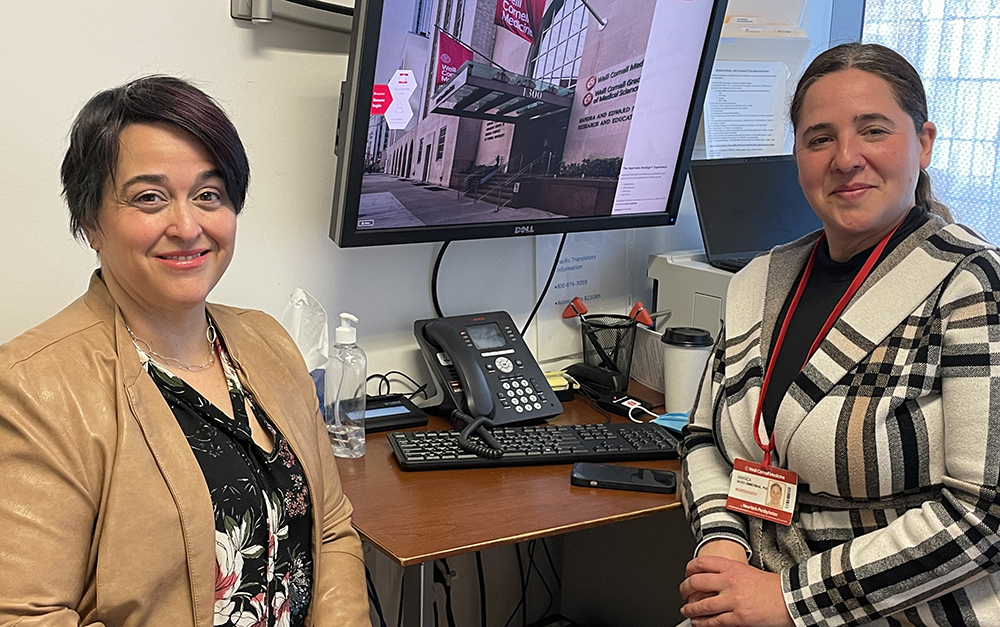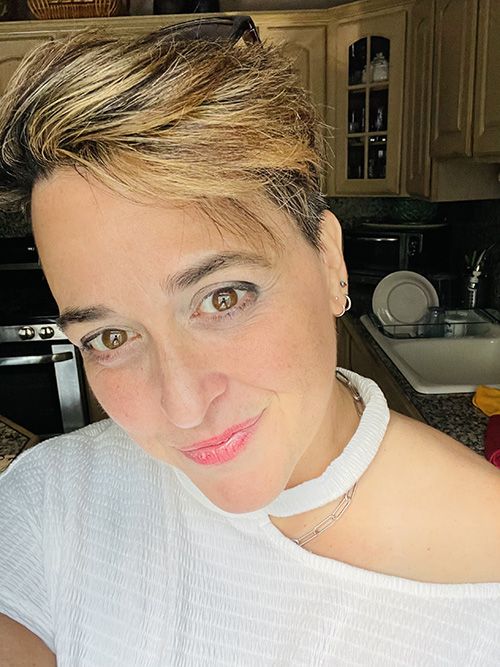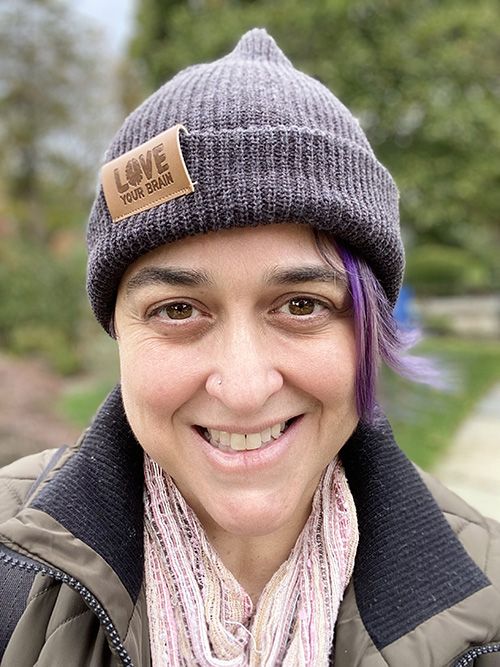
Cognitive remediation helps a stroke survivor find her new normal
Nothing was normal in 2020, but by the summer of that first pandemic year 47-year-old Tania Saiz and her fiancé felt good about traveling from their home in White Plains, New York, to Colorado. The plan was to enjoy some time there after the pain of the lockdowns, maybe look for a home there. Tania’s daughter was studying at the University of Colorado in Denver and the prospect of starting a new chapter out West seemed downright tantalizing.
Life had other plans for Tania, however, and what happened on that trip upended everything. A devastating stroke was the start of a journey to her new life, tapping into strength she never knew she had, with help from neuropsychologist Amanda Sacks-Zimmerman of Weill Cornell Medicine Neurological Surgery.
A few weeks into that visit, her fiancé having returned to New York, Tania woke up feeling fine, then 15 minutes after awakening she saw a blinding light in her right eye – she describes it as a crack of lightning. Suddenly unsteady on her feet, Tania knew something was wrong but had no idea that she was having a stroke. Fortunately, her daughter was with her.
“Neither of us had any clue what was happening,” says Tania. “She immediately called my fiancé back in New York, then very quickly, as things progressed, she dialed 911.”
Tania was taken to a local hospital, where doctors tried and failed four times to perform a thrombectomy to remove a blood clot in her brain. The damage had been done.
Tania spent 20 days in the hospital, including two stays in an intensive care unit – the second one after the ischemic stroke converted to a hemorrhagic stroke. (Hemorrhagic transformation is a complication of ischemic stroke in which bleeding occurs across the blood-brain barrier; a hemorrhagic stroke is much more dangerous than an ischemic stroke.) Far from ready to go home, Tania was sent to an acute rehabilitation facility, where she had physical therapy for walking and balance, occupational therapy to help her with everyday activities like dressing and brushing her teeth, and speech therapy to help her regain the ability to communicate well.
“I got stronger, and left rehab far more confident,” Tania says. “The therapists there helped me see I was capable of anything I set my mind on.”
Back in New York that fall, Tania had surgery to repair a patent foramen ovale (a small hole in her heart, a common birth defect that rarely causes complications but does increase stroke risk). With her risk of a second stroke greatly reduced, and making progress with PT, OT, and speech therapy, Tania knew there was still more work to do — she just didn’t know what it was.
“I don’t recall ever hearing the words cognitive remediation,” she says. “But I would lose focus, forget things. Thinking hurt, and words were hard to find.” Tania didn’t have the vocabulary yet to describe her symptoms, but she was experiencing very typical post-stroke deficits. She found she moved and thought more slowly than she had before the stroke.
“It seems to be common knowledge that a stroke in a particular area of the brain can affect different parts of the body,” explains Dr. Sacks-Zimmerman. “For example, a stroke in your speech center, or in your motor cortex, has very predictable effects. What is less obvious, however, is that there can also be specific and downstream effects on cognitive domains – depending on where a stroke occurs, patients end up with deficits in attention, working memory, and executive functioning which can negatively impact short-term memory. These symptoms are very real, BUT they can be addressed. That’s the practice of cognitive remediation — learning to restore lost function or to compensate for deficits using healthy parts of the brain.”
That fall, Tania was describing her struggles to a friend who happens to work at Weill Cornell Medicine. There was a webinar coming up, her friend told her, about the role of cognitive remediation in recovering from a stroke. Maybe it would help?
“I attended the webinar,” says Tania, “which in some ways was over my head. But when my physiatrist told me to have a cognitive evaluation before returning to work, I thought about what I’d heard that day and made an appointment with Dr. H. Allison Bender. The evaluation revealed a mild neurocognitive disorder, and she recommended cognitive remediation with Dr. Amanda Sacks-Zimmerman. I began that therapy soon afterward.”
Tania soon learned the vocabulary for what she’d been experiencing. “Attention, working memory, executive function – they are all fancy words for ‘I lose focus, I forget, thinking hurts, and words are hard.’ I have worked on time management, enhancing focused and sustained attention, working memory, information processing, mental flexibility, and managing complex tasks and timelines.”
She also learned that neuro-fatigue is real. “Thinking actually hurts at times!” she says. “Not taking breaks, or not recognizing the onset of neuro-fatigue can be debilitating.” Tania learned this firsthand when she returned to work in the spring of 2021 and faced a weeklong series of meetings. By the fourth day she was depleted.
“I was so cognitively stretched beyond my limits that I had to sleep for two days to recover,” she recalls. But Tania was learning what it was like to have an invisible injury. “Expressing your cognitive limitations makes you feel very vulnerable,” she says, “so I tried keeping up so as not to appear less capable.”
“Non-visible disabilities are cumbersome,” she continues, “especially in a work setting. I’ve found the most support when I have been candid and most vulnerable about what’s going on— asking for help. There comes a point where certain people seem to reach empathy fatigue – they just want you to be back to normal. It’s those people, who think you should just be over it already, that tend to be the biggest drain.”

Tania Saiz found new ways to reclaim her sense of self in session with Dr. Amanda Sacks-Zimmerman
Dr. Sacks-Zimmerman points out that cognitive deficits take time to address, and it’s no more possible to just “get over it already” than it would be to “get over” a physical limitation. It’s a process, she says, no less than physical or occupational therapy, and there are concrete steps patients take during recovery.
“Our sessions are very focused,” says Tania. “We talk about what symptoms might be related to the stroke versus what might be stylistic. That’s a term I really like – it’s a way to discern what is brain injury versus my own style, the way I've always done things. Perhaps I can't handle doing those things in the same manner due to the brain injury. Without this therapy, I do not think I could have returned to any sense of normalcy, let alone work.”
Dr. Sacks-Zimmerman helps Tania organize her tasks and prepare for both routine and novel situations. For example, Tania reported feeling overwhelmed with work tasks, not knowing where to start or how to incorporate all the moving parts. Using the strategy of goal management, Dr. Sacks-Zimmerman taught Tania how to break down tasks into smaller ones, how to decide when to delegate aspects of tasks, and how to derive sequenced steps with checkpoints so as to ensure successful completion of tasks.
A similar process worked for less common events, like Election Day. “I’ve voted since I was 18, but it doesn’t happen that frequently,” says Tania. “I was in a panic trying to understand the ballot. I discussed it with Dr. Sacks-Zimmerman, talked about needing to take an extra step to be prepared when I might encounter something unique and unexpected — even when it’s quasi-familiar. The awareness and strategy have helped me tremendously.”

Tania remains grateful to her friend at Weill Cornell Medicine for recommending that webinar, but she says that conversation gave her an even greater gift. “She shared a bit of motivation with me,” Tania recalls. “She told me that when she was growing up, her dad would always tell his kids it didn't really matter how long it took them to learn a particular skill. Speed would come, or not, but sticking with it and seeing it through was the important part. This perspective could not be more true than in stroke recovery. It requires consistency and appreciation of the sometimes subtle changes that can easily be overshadowed if one focuses on what’s still difficult.”
Today, as she approaches her three-year “strokiversary,” Tania says she’s learned a lot from the experience. “My brain injury has taught me to pay attention to my body, to slow down, and to be more mindful and present,” she muses. “I think the most important insight I’ve gained is that no one is too young to have a stroke. There also are not consistent resources or support post-stroke, so not everyone knows about things like cognitive remediation – that needs to change! To navigate my recovery, I have needed to be very assertive and advocate for myself, which is easier said than done.”
Dr. Sacks-Zimmerman says her goal is to help patients use cognitive remediation to be their own neuropsychologists. “I help patients learn that there is always a way, they just have to think about what strategy to put in place. People have strengths that are still there even after a stroke; those strengths can be tapped to get them functioning again!”
More about cognitive remediation